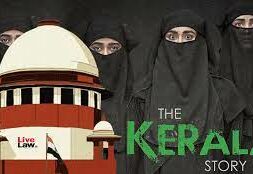
The Kerala Story: SC Stayed Ban in West Bengal, Asked Makers to Put Disclaimer it being “Fictional Account of Events”
Manas Dasgupta
NEW DELHI, May 18: The Supreme Court on Thursday set aside the ban on screening of the film “The Kerala Story” by the West Bengal and asked the Tamil Nadu government to provide adequate security to the movie-goers while asking the film makers to introduce a disclaimer that it was merely a fictionalised account of events and there was no data to back its claim that 32,000 women in Kerala were actually forced to convert to Islam and join ISIS.
A three-judge Bench led by Chief Justice of India D.Y. Chandrachud said the state government has to maintain law and order as the film has been granted certification by the Central Board of Film Certification (CBFC).
Recording the submission of the Tamil Nadu government which did not impose a ban but maintained that the distributors were not screening the film fearing violence, the court directed the State to provide adequate security measures in theatres and for moviegoers.
“Prima facie we are of the view that the prohibition by West Bengal is not tenable on the basis of material before. Thus, the order banning the film is stayed,” the court ordered. The disclaimer, which must be added by 5 pm on Saturday, should say that “there is no authenticated data to back up the suggestion on the figure of conversion and the film represents the fictionalised version,” the court said.
On the petition challenging the CBFC certification of the film, the court said it would be listed in July, after its summer vacation, as it would first have to see the movie.
Observing that “bad films bomb at the box office”, the court said, “The legal provision cannot be used to put a premium on public intolerance. Otherwise, all films will find themselves in this spot.” Appearing for the producer of the movie, senior advocate Harish Salve said states cannot sit in appeal over the grant of certification to a movie but agreed to arrange the disclaimer about the film being a fictionalised depiction.
The top court was hearing cross-pleas with the producer of the film challenging the ban on its screening in West Bengal and the decision by theatre owners in Tamil Nadu to not show the movie in the state, while journalist Qurban Ali has challenged the Kerala High Court order refusing to stay the release of the film.
The Sudipto Sen directorial, which was released in cinemas on May 5, sparked controversy by alleging that thousands of women in Kerala were forced to convert to Islam, and they joined ISIS, which critics have pointed out is a claim without evidence. It has also been accused by the opposition of propagating stereotypes and fanning communal hatred but has been backed by several BJP leaders, including Prime Minister Narendra Modi. The BJP government in Uttar Pradesh has also waived the tax on the film’s tickets.
During the hearing, Chief Justice Chandrachud orally observed that “32,000 is a distortion of fact”, and asked senior advocate Harish Salve, “What are you doing about that?” He also remarked, “We do protect free speech, but vilifying a community…”
Salve said there was no “authentic figure” about the number of conversions made. “I will clarify in the disclaimer that there is no authentic data available,” he suggested to the court. Senior advocate Kapil Sibal, for Tamil Nadu, reacted to the suggestion, saying, “that would be much, much worse”. He further submitted, “We are all for freedom of speech, but this is hate dramatised. Millions of people watch the film… Even an art form is subject to restrictions on free speech under Article 19(2) of the Constitution.”
“You are saying that the ban of the film is on the basis of 13 people… You get any 13 people, they will say ban any movie unless you are showing them cartoons,” Chief Justice Chandrachud addressed the West Bengal government. The court said the powers of the State under Section 6(1) of the West Bengal Cinema (Regulation) Act could not be used to put a premium on public intolerance.
The court said the ban must be proportional to the threat perception. Rather than a State-wide ban, the screening of the film could be controlled in areas where there was a likelihood of disturbance, it said. “Exercise of fundamental rights cannot be dependent on public emotion. Public display of emotion has to be controlled,” the court observed.
The petitioners urged the judges to watch the movie during the vacation and intervene if they felt there was a need for further judicial intervention. The court listed the case on July 18.













